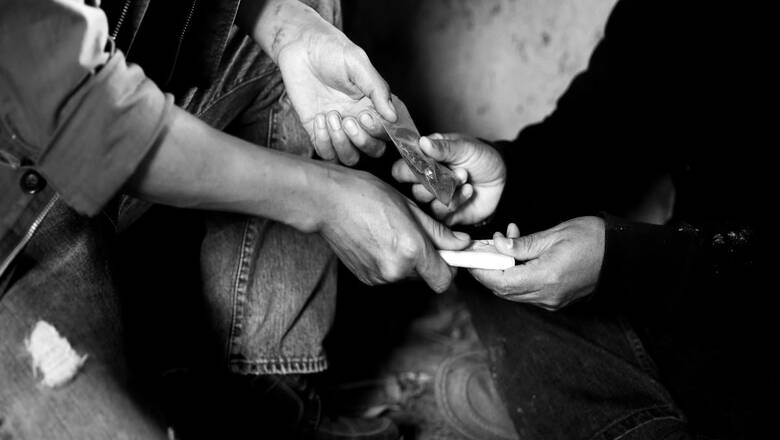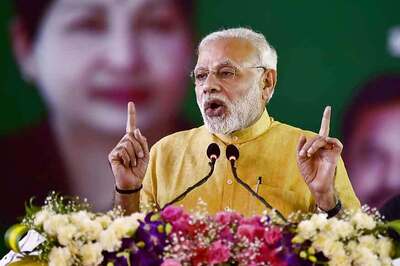
views
Drug trafficking in India is directed, monitored, and controlled by extra-hemispheric actors, comprising various nationalities, having strong terror links. There are no magic-bullet solutions to solve this problem, which affects many other nations across the globe. India’s status as a pluralistic, democratic country, affects its strategic position as well as the economic health and political dynamics of the region.
Drug trafficking is the most effective weapon to strategically destabilise the country and also for creating opportunities for active collaboration with religious fundamentalists and separatists. Political commitments and limitations, have over the past several decades, resulted in a lack of bureaucratic and legislative agility in tackling drug trafficking. The government is also constrained by its own laws, and the liberal interpretation and attitude of the judiciary, which places emphasis on additional associated freedoms and the protection of various rights.
This is hampering two complementary types of drug enforcement activities: (1) those oriented toward preventing, addressing the effects of, or otherwise dealing with the specific harmful and destructive activities of extra-hemispheric actors, and (2) shaping the strategic playing field in the region, within which that engagement occurs.
Thus, whether it is Kashmir, Punjab, Manipur, Gujarat, the entire stretch of the West coast, and distant Lakshadweep, extra-hemispheric actors are taking undue advantage of fundamental rights and freedoms, procedural democracy, rule of law, protection of rights, and judicial delays to successfully avoid even a reasonable term of punishment. Survey of a few events from near and far, when juxtaposed with legal verdicts, emanating from different courts in the country, makes illuminating understanding.
On March 10, 2023, Kenya jailed six Pakistanis and one Iranian national who were found guilty of trafficking heroin via the Indian Ocean to Kenya’s coastal city of Mombasa and sentenced them to life in prison. The men were in custody since 2014 when they were arrested and charged with trafficking heroin worth 1.3 billion Kenya shillings ($10 million). The ship was destroyed in an operation that was supervised by the then President Uhuru Kenyatta, who reiterated the country’s strict stance against drug trafficking.
On August 3, 2023, Singapore executed Mohamed Shalleh Abdul Latiff, a 39-year-old Singaporean for trafficking 54 grams (1.9 ounces) of heroin, an amount “sufficient to feed the addiction of about 640 abusers for a week,” it said in a statement. Two other citizens were executed prior to this. Saridewi Djamani, 45, who was the first woman to be hanged in 19 years, for trafficking about 31 grams (1 ounce) of heroin; and Mohammed Aziz Hussain, 56, hanged for trafficking around 50 grams (1.75 ounces) of heroin.
Compare the above actions with what is happening in our country.
On May 11, 2023, the Allahabad High Court Neutral Citation No. 2023:AHC:97588-DB judgement, delivered on May 5, 2023, in Habeas Corpus Writ Petition No. 729 of 2022, while allowing the petition said that the preventive detention laws in India are a colonial legacy and have a great potential to be abused and misused. Laws that have the ability to confer arbitrary powers to the state, must in all circumstances, be very critically examined and must be used only in the rarest of rare cases, the Court said. In this case, on January 4, 2016, the Zonal Director, NCB Lucknow officials intercepted a vehicle and recovered 312 kgs of Ganja. He managed to get out on bail. On October 25, 2020, the same person was again apprehended along with three other persons, transporting a total quantity of 170 kgs of Ganja.
The preventive detention of such repeat offenders gets trashed while ignoring the deliberate intent to harm society and future generations that they are causing. Is his freedom and liberty greater than those he is mentally and physically wrecking?
On October 1, 2022, terming preventive detention as a “serious invasion of personal liberty”, the Supreme Court ordered forthwith the release of a man arrested under the Prevention of Illicit Traffic in Narcotic Drugs and Psychotropic Substances Act, (PIT-NDPS) 1988, for withholding bail orders by detaining authorities. SC Bench of the Chief Justice of India and two other judges set aside a Tripura High Court verdict which held that if the detenu was not prejudiced by non-supply of a particular document, he couldn’t gain any benefit merely by agitating that a document mentioned in the detention order was not supplied. It also took exception to the unexplained delay in detention of accused Sushanta Kumar Banik and withholding bail orders by detaining authorities, saying whatever little safeguards the Constitution and the law authorising such action provided must be strictly adhered to.
For the drug trafficker to agitate the non-furnishing of a document is a grave violation of his rights, but his deliberate act of causing the horrible destruction of hundreds of human minds and bodies gets overlooked by the judiciary. The unknown and unseen addicted victims can never get impleaded in cases filed by drug traffickers.
The Manipur High Court in W.P. (Crl) No. 45 of 2022, Md. Nawaz Khan vs Special Secretary, held that “in Sarabjeet Singh Mokha Vs District Magistrate, Jabalpur, and others [(Criminal Appeal No. 1301 of 2021, decided on October 29, 2021, the Supreme Court held that by delaying a decision on such representation, the state government denied the detenu a valuable statutory right. The Supreme Court observed that the delay by the state government in disposing of such representation strikes at the heart of the procedural rights and guarantees granted to a detenu. “Though it is laudable that the Government of Manipur is waging a ‘war on drugs’ and initiating stringent measures to arrest the menace of illicit drug manufacture, trafficking and marketing in and through the State of Manipur, it is equally its responsibility to ensure that procedural safeguards are taken note of strictly so as to protect the Constitutional and statutory rights of persons detained under preventive detention laws. A copy of this order shall be sent to the Chief Secretary, Government of Manipur, for information and necessary further action in the context of educating the detaining authorities in the State of Manipur as to what are the procedural norms that they need to adhere to while exercising power and jurisdiction under preventive detention laws.”
Manipur is in the throes of an internecine drug war, which the court also acknowledges, but the right of the detenu to have his representation considered expeditiously is supreme! The state is experiencing extreme turmoil between different communities, due to cross-border drug trafficking. Is it justified to give priority to the rights of drug traffickers, when they are culpable for the miseries inflicted on thousands of families?
In another case of Kaikam Kigpen Vs State of Manipur, the High Court of Manipur (W.P. (Crl) No.32 of 2022, referred to the Supreme Court case of Union of India Vs Paul Manickam and Anr, reported in (2003) 8 SCC 342, at para 16 where it was held that “meticulous compliance of the procedural safeguard provided in a preventive detention, however, technical, is mandatory.
Paragraph 16 – “In a case of preventive detention no offence is proved, nor is any charge formulated and the justification of such detention is suspicion or reasonability and there is no criminal conviction which can only be warranted by legal evidence. Preventive justice requires action to be taken to prevent apprehended objectionable activities. (See R. v. Halliday and Kubic Darusz v. Union of India). But at the same time, a person’s greatest of human freedoms i.e. personal liberty is deprived, and, therefore, the laws of preventive detention are strictly construed, and meticulous compliance with the procedural safeguard, however technical, is mandatory. The compulsions of the primordial need to maintain order in society, without which enjoyment of all rights, including the right of personal liberty would lose all their meanings, are the true justifications for the laws of preventive detention. This jurisdiction has been described as a ‘jurisdiction of suspicion’, and the compulsions to preserve the values of lazy bureaucratic foot-dragging.”
Such verdicts may appear lawful, appropriate and even numbingly routine, but who will see and hear the miseries of the thousands of unfortunate drug addicts and their families? Most states in the Northeast do not have enough rehabilitation centres to take care of the addicts. HIV infected population is also alarmingly high in Manipur. However, the rights of the traffickers are considered more important, to denote that democracy is perfectly functioning in our country.
Fortunately, another verdict from another court gives hope for the voiceless and the unrepresented. The Jammu and Kashmir and Ladakh High Court dismissed the plea of an alleged drug trafficker detained under the PIT-NDPS. The court observed that the involvement of various terrorist groups and syndicates in drug trafficking leads to a threat to the national security and sovereignty of States by way of narco-terrorism. The court observed, “Drug trafficking and abuse has continued its significant toll on valuable human lives and productive years of many persons around the globe. With the growth and development of the world economy, drug traffickers are also seamlessly trafficking various types of drugs from one corner to another ensuring the availability of contrabands for vulnerable segments of society who fall into the trap of drug peddlers and traffickers.”
Furthermore, the court said on the serious drug menace affecting India, “Due to India’s close proximity with major opium growing areas of the region, India is facing the serious menace of drug trafficking and as a spill-over effect, drug abuse, especially among the youth, is a matter of concern for us.” The court noted that “India has been facing a problem of transit traffic in illicit drugs. The spillover from such traffic has caused tribulations of abuse and addiction. This trend has created an illicit demand for drugs within the country.”
The court also observed that the illicit traffic of narcotic drugs and psychotropic substances poses a serious threat to the health and welfare of the people. The court referred to the Supreme Court’s observations in Prakash Chandra Mohan Vs Commissioner (1986) while dealing with the question of preventive detention, wherein the SC observed that “it must be remembered that observance of written law about the procedural safeguards for protection of individual is normally the high duty of public official but in all circumstances not the highest. The law of self-preservation and protection of the country and national security may claim in certain circumstances higher priority.”
Fortunately, a few courts in this country are seeing the bigger picture, that there are extra-hemispheric forces, using the destructive power of narcotic drugs to damage the fabric of Indian democracy.
What is the situation in the US? In 1984, the US Congress adopted a preventive detention act allowing federal courts to detain arrestees pending trial if the government could show that no release conditions could protect the safety of persons and the community. The act was challenged before the US Supreme Court in United States v. Salerno, decided in 1987. The court held that the preventive detention bill violated neither the due process clause of the Fifth Amendment nor the excessive bail language of the Eighth Amendment. After Salerno, preventive detention laws were adopted in a number of US states.
Indian courts need to see the bigger picture, otherwise, we will remain well short of the sustained, comprehensive, energized response that counter-narcotics efforts demand. Manipur is a living example of a societal collapse breaking into a drug-dictated civil war. When offender-detenus are being released in the name of transparency and procedural violations, why is no written undertaking being taken for their future commitment not to repeat or indulge in drug trafficking or any drug-gang activity?
Drug empire builders should fear that courts will aggressively isolate them from offences like drug trafficking, funding extremism, and the horrors of terrorism.
Dr G Shreekumar Menon IRS (Rtd), PhD (Narcotics), is Former Director General, National Academy of Customs, Indirect Taxes & Narcotics. Views expressed in the above piece are personal and solely that of the author. They do not necessarily reflect News18’s views.




















Comments
0 comment